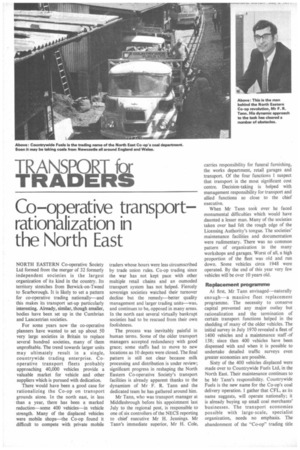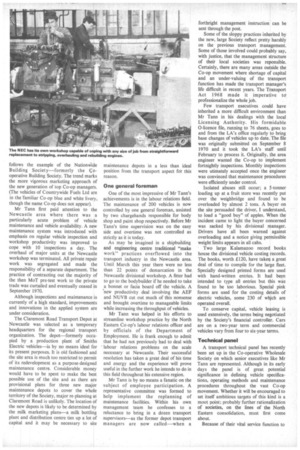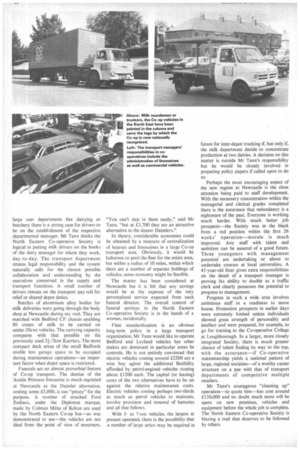J r 1Z41\ A IS606 1 fa
Page 66

Page 67

Page 68

If you've noticed an error in this article please click here to report it so we can fix it.
Go-operative transport rationalization in the North East
NORTH EASTERN Co-operative Society Ltd formed from the merger of 32 formerly independent societies is the largest organization of its kind in the country. Its territory stretches from Berwick-on-Tweed to Scarborough. It is likely to set a pattern for co-operative trading nationally—and this makes its transport set-up particularly interesting. Already, similar, though smaller, bodies have been set up in the Cumbrian and Lancastrian societies.
For some years now the co-operative planners have wanted to set up about 50 very large societies in Britain to replace several hundred societies, many of them unprofitable. The trend towards larger units may ultimately result in a single, countrywide trading enterprise. Cooperative transport fleets probably approaching 40,000 vehicles provide a valuable market for vehicle and other suppliers which is pursued with dedication.
There would have been a good case for rationalizing the Co-op on transport grounds alone. In the north east, in less than a year, there has been a marked reduction—some 400 vehicles—in vehicle strength. Many of the displaced vehicles were mobile shops—the Co-op found it difficult to compete with private mobile traders whose hours were less circumscribed by trade union rules. Co-op trading since the war has not kept pace with other multiple retail chains and an oumoded transport system has not helped. Fiercely sovereign societies watched their turnover decline but the remedy—better quality management and larger trading units—was, and continues to be, opposed in many areas. In the north east several virtually bankrupt societies had to be rescued from their own foolishness.
The process was inevitably painful in human terms. Some of the older transport managers accepted redundancy with good grace; some stairs had to move to new locations as 10 depots were closed. The final pattern is still not clear because milk processing and distribution is under review; significant progress in reshaping the North Eastern Co-operative Society's transport facilities is already apparent thanks to the dynamism of Mr F. R. Tann and the dedicated team he has gathered around him.
Mr Tann, who was transport manager at Middlesbrough before his appointment last July to the regional post, is responsible to one of six controllers of the NECS reporting to chief executive Mr H. Jennings. Mr Tann's immediate superior, Mr H. Cole,
carries responsibility for funeral furnishing, the works department, retail garages and transport. Of the four functions I suspect that transport is the most significant cost centre. Decision-taking is helped with management responsibility for transport and allied functions so close to the chief executive.
When Mr Tann took over he faced monumental difficulties which would have daunted a lesser man. Many of the societies taken over had felt the rough edge of the Licensing Authority's tongue. The societies' maintenance facilities and documentation were rudimentary. There was no common pattern of organization in the many workshops and garages. Worst of all, a high proportion of the fleet was old and run down. Some vehicles circa 1948 were operated. By the end of this year very few vehicles will be over 10 years old.
Replacement programme
At first, Mr Tann envisaged—naturally enough—a mass-ive fleet replacement programme. The necessity to conserve capital prevented any major outlay but rationalization and the termination of certain transport functions helped in the shedding of many of the older vehicles. The initial survey in July 1970 revealed a fleet of 1400 vehicles and a maintenance staff .of 138; since then 400 vehicles have been dispensed with and when it is possible to undertake detailed traffic surveys even greater economies are possible.
Sixty of the 400 vehicles displaced were made over to Countrywide Fuels Ltd, in the North East. Their maintenance continues to be Mr Tann's responsibility. Countrywide Fuels is the new name for the Co-op's coal delivery operation. I gather that CFL, as its name suggests, will operate nationally; it is already buying up small coal merchants' businesses. The transport economies possible with large-scale, specialist organization, needs no emphasis. The abandonment of the "Co-op" trading title
follows the example of the NationWide Building Society---formerly the cooperative Building Society. The trend marks the more vigorous marketing approach of the new generation of top Co-op managers. (The vehicles of Countrywide Fuels Ltd are in the familiar Co-op blue and white livery, though the name Co-op does not appear).
Mr Tann first paid attention to the Newcastle area where there was a particularly acute problem of vehicle maintenance and vehicle availability. A new maintenance system was introduced with emphasis on regular vehicle inspection and workshop productivity was improved to cope with 10 inspections a day. The overhaul of major units at the Newcastle workshop was terminated. All private repair work was segregated and made the responsibility of a separate department. The practice of contracting out the majority of the then MoT pre-test work to the private trade was curtailed and eventually ceased in September 1970.
Although inspections and maintenance is currently of a high standard, improvements and innovations in the applied system are under consideration.
The Claremont Road Transport Depot at Newcastle was selected as a temporary headquarters for the regional transport organization. The depot—formerly occupied by a production plant of Smiths Electric vehicles—is by no means ideal for its present purposes. It is old fashioned and the site area is much too restricted to permit of its redevelopment as a purpose-designed maintenance centre. Considerable money would have to be spent to make the best possible use of the site and as there are provisional plans for three new major maintenance depots to cover the whole territory of the Society, major re-planning at Claremont Road is unlikely. The location of the new depots is likely to be determined by the milk marketing plans—a milk bottling plant and distribution centre ties up a lot of capital and it may be necessary to site maintenance depots in a less than ideal position from the transport aspect for this reason.
One general foreman
One of the most impressive of Mr Tann's achievements is in the labour relations field. The maintenance of 200 vehicles is now controlled by one general foreman, assisted by two chargehands responsible for body shop and paint shop respectively. Before Mr Tann's time supervision was on the easy side and overtime was not controlled as strictly as it is today.
As may be imagined in a shipbuilding and engineering centre traditional "make work" practices overflowed into the transport industry in the Newcastle area. Until March this year there were no less than 22 points of demarcation in the Newcastle divisional workshop. A fitter had to go to the bodybuilder if he needed to take .a bonnet or facia board off the vehicle. A new productivity deal involving the AEF and NUVB cut out much of this nonsense and brought overtime to manageable limits while increasing the throughput of vehicles.
Mr Tann was helped in his efforts to streamline workshop practice by the North Eastern Co-op's labour relations officer and by officials of the Department of Employment. He is frank enough to admit that he had not previously had to deal with • labour relations problems on the scale necessary at Newcastle. Their successful resolution has taken a great deal of his time and energy and the experience will prove useful in the further work he intends to do in this field throughout his extensive region.
Mr Tann is by no means a fanatic on the subject of employee participation. A representative committee was formed to help implement the replanning of maintenance facilities. Within his own management team he confesses to a reluctance to bring in a dozen transport supervisors—as the former depot transport managers are now called—when a forthright management instruction can be sent through the post.
Some of the sloppy practices inherited by the new, large Society reflect pretty harshly on the previous transport management. Some of those involved could probably say, with justice, that the management structure of their local societies was reponsible. Certainly, there are many areas outside the Co-op movement where shortage of capital and an under-valuing of the transport function has made the transport manager's life difficult in recent years. The Transport Act 1968 made it imperative tcr professionalize the whole job.
Few transport executives could have inherited a more difficult environment than Mr Tann in his dealings with the local Licensing Authority. His formidable 0-licence file, running to 76 sheets, goes to and from the LA's office regularly to bring base changes of vehicles up to date. The file was originally submitted on September 8 1970 and it took the LA's staff until February to process it. Originally, the area engineer wanted the Co-op to implement fortnightly inspections. Monthly inspections were utimately accepted once the engineer was convinced that maintenance procedures were efficiently under control.
Isolated abuses still occur: a 5-tonner loading up at a fruit store was recently put over the weighbridge and found to be overloaded by almost 2 tons. A buyer on the site persuaded the driver, I understand, to load a "good buy" of apples. When the incident came to light the buyer concerned was sacked by his divisional manager. Drivers have all been warned against overloading and a notice giving permissible weight limits appears in all cabs.
Two large Kalamazoo record books house the divisional vehicle costing records. The books, worth £120. have taken a great deal of time to compile for the large fleet. Specially designed printed forms are used with hand-written entries. It had been intended to type all entries but this was found to be too laborious. Special pink forms are used for the costing details of electric vehicles, some 230 of which are operated overall.
To conserve capital, vehicle leasing is used extensively, the terms being negotiated by the Society's financial controller. Cars are on a two-year term and commercial vehicles vary from four to six-year terms.
Technical panel
A transport technical panel has recently been set up in the Co-operative Wholesale Society on which senior executives like Mr Tann are represented. Although in its early days the panel is of great potential significance in defining vehicle specifications, operating methods and maintenance procedures throughout the vast Co-op movement. Whether it will be encouraged to set itself ambitious targets of this kind is a moot point: probably further rationalization of societies, on the lines of the North Eastern consolidation, must first come about.
Because of their vital service function to
large user departments like dairying or butchery there is a strong case for drivers to be on the establishment of the respective departmental manager. Mr Tann thinks the North Eastern Co-operative Society is logical in putting milk drivers on the books of the dairy manager for whom they work, day-to-day. The transport department retains legal responsibility and the system naturally calls for the closest possible collaboration and understanding by the executives concerned in the supply and transport functions. A small number of drivers remain on the transport pay-roll for relief or shared depot duties.
Batches of aluminium alloy bodies for milk deliveries were going through the body shop at Newcastle during my visit. They are matched with Bedford CF chassis enabling SO crates of milk to be carried on under-30cwt vehicles. The carrying capacity compares with that possible on the previously used 2i /3 ton Karriers. The more compact deck areas of the small Bedfords enable less garage space to be occupied during maintenance operations—an important factor when depot space is restricted.
Funerals are an almost proverbial feature of Co-op transport. The demise of the Austin Princess limousine is much regretted at Newcastle as the Daimler alternative, costing some £5,000, is too "pricey" for the purpose. A number of streched Ford Zodiacs, under the Diplomat marque, made by Colman Milne of Bolton are used by the North Eastern Co-op but—as was demonstrated to me—the vehicles are not ideal from the point of view of mourners. "You can't step in them easily," said Mr Tann, "but at 0,700 they are an attractive alternative to the dearer Daimlers."
In theory, considerable economies could be obtained by a measure of centralization of hearses and limousines in a large Co-op transport area. Obviously, it would be ludicrous to pool the fleet for the entire area, but within a radius of 10 miles, within which there are a number of separate holdings of vehicles, some economy might be feasible.
The matter has been considered at Newcastle but it is felt that any savings would be at the expense of the very personalized service expected from each funeral director. The overall control of funeral services in the North Eastern Co-operative Society is in the hands of a woman, incidentally.
Fleet standardization is an obvious long-term policy in a large transport organization. Mr Tann would like to operate Bedford and Leyland vehicles but other makes are dominant in particular areas he controls. He is not entirely convinced that electric vehicles costing around £2200 are a wise buy aginst the additional flexibility afforded by petrol-engined vehicles costing about £1200 each. The capital (or leasing) costs of the two alternatives have to be set against the relative maintenance costs. Electric vehicles costing perhaps two-thirds as much as petrol vehicles to maintain, involve provision and renewal of batteries and all that follows.
With 5to 7-ton vehicles, the largest at present operated, there is the possibility that a number of large artics may be required in future for inter-depot trunking if, but only if, the milk department decide to concentrate production at two dairies. A decision on this matter is outside Mr Tann's responsibility but he would be closely involved in preparing policy papers if called upon to do
SO.
Perhaps the most encouraging aspect of the 'new regime at Newcastle is the close attention being paid to staff development. With the necessary concentration within the managerial and clerical grades completed there is the assurance that redundancy is a nightmare of the past. Everyone is working much harder. With much better job prospects—the Society was in • the black from a red position within the first 26 weeks' operation—morale is much improved. Any staff with talent and ambition can be assured of a good future. Three youngsters with management potential are undertaking or about to undertake courses at local universities. A 45-year-old fitter given extra responsibilities on the death of a transport manager is proving his ability to double as a traffic clerk and clearly possesses the potential to progress to management.
Progress in such a wide area involves ambitious staff in a readiness to move house. Promotion prospects in earlier days were extremely limited unless individuals showed great strength of personalitY and intellect and were prepared, for example, to go for training to the Co-operative College at Loughborough. In a larger, more closely integrated Society, there is much greater chance of talent finding its way to the top, with the assurance--if Co-operative statesmanship yields a national pattern of large, regional societies—of a worthy career structure on a par with that of transport departments of competitive multiple retailers.
Mr Tann's courageous "cleaning up" operation—to quote him—has cost around £130,000 and no doubt much more will be spent on new premises, vehicles and equipment before the whole job is complete. The North Eastern Co-operative Society is blazing a trail that deserves to be followed by others.












































































































































